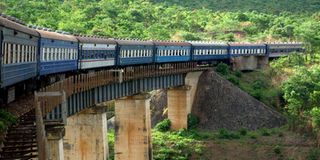Tanzania and Zambia Railway Authority still buoyant despite 9.7pc fall in freight volumes

Dar es Salaam. Freight volume handled by the Tanzania and Zambia Railway Authority (Tazara) dropped by 9.7 percent in the second-half of the 2019 calendar year.
Tazara handled a total of 98,024 tonnes of cargo during the second-half of the 2018 calendar year but the amount dropped to 88,529 tonnes during the similar period last year.
The drop was largely due to unreliability of locomotives and a fall in manganese exports from Zambia to China, authorities say.
“The drop was due to unreliability and availability of locomotives and wagons. When they get damaged, we spend more time to transport goods - thus retarding our ability to transport more cargo and fail to meet our targets,” said the Tazara managing director, Bruno Ching’andu.
He said the drop was also a result of new customs clearance procedures in the Democratic Republic of Congo (DRC), which became operational after the new government, under President Felix Tchisekedi, came to power.
With the new procedures, it takes more time for goods to be cleared, thus affecting the speed at which Tazara transports goods.
A considerable business volume also depends on the volume of manganese that Zambia exports to China. “During past months, there has been a drop in manganese exports from Zambia due to a drop in prices in China. This also reduced the cargo we transport,” he said.
However, some of the factors will soon become a thing of the past after the government of Tanzania availed Sh10 billion for Tazara to purchase traction motors for fixing seven locomotives.
This will bring the total number of operating locomotives to 18. Currently, Tazara has only 12 locomotives - not all of which are reliable. “In short, we need a total of 36 locomotives to operate efficiently. But with only 18 - which are not all in promecondition - we cannot do better,” he said.
He said Zambia and Tanzania have also permitted Tazara to hire locomotives, noting that a foreign firm has already delivered two out of the ten locomotives that Tazara has hired.
Data show that Tazara also performed poorly in terms of the number of passengers it transported, which dropped by 11.1 percent from 1,184,768 during the second-half of 2018 to 1,052,672 during the second half of 2019.
“The decline came after the Tanzania Railway Corporation (TRC) started its city train services between the Kariakoo and Pugu. It is a preferred route than ours which ends at our headquarters where commuters are forced to look for other transport to the central business district,” he said.
However, all was not lost for Tazara which saw to the number of its cross-border passengers increasing by 9.2 percent.
It ferried 284,295 passengers during the second-half of 2018, rising to 310,496 during the similar period in 2019.
This, the Authority says, was largely due to the repairing of its passenger coaches.
During its January 13, 2020 meeting, the Tazara board of directors directed the management to avert the situation and bring its performance back on track.
“We have directed the management to aggressively seek additional freight traffic and capture more business...,” reads the statement signed by Works, Transport and Communications permanent secretaries from the two partner countries, Dr Leornard Chamuriho and Mr Misheck Lungu from Tanzania and Zambia respectively.
Mr Ching’andu said efforts put in place would see to Tazara transporting 300,000 tonnes of cargo and 800,000 passengers in the 2019/20 fiscal year and generate Sh112 billion in revenue.
He said the authority was finalizing preparation of a bankable business plan which will be handled to the council of ministers and board of directors in March this year.
“It is this document that will determine the amount required for recapitalization.
However, sources of funding will be determined by the two partner countries in the business,” he said.
Recently, the Tanzania and Zambia transport ministers were expected to sign a bilateral agreement to review the Tazara Act in order to attract more players.
The two countries are planning to pass preferential policies so that at least 30 percent of bulk cargo is transported by rail.




